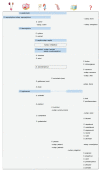Update on Coagulase-Negative Staphylococci-What the Clinician Should Know
- PMID: 33919781
- PMCID: PMC8070739
- DOI: 10.3390/microorganisms9040830
Update on Coagulase-Negative Staphylococci-What the Clinician Should Know
Abstract
Coagulase-negative staphylococci (CoNS) are among the most frequently recovered bacteria in routine clinical care. Their incidence has steadily increased over the past decades in parallel to the advancement in medicine, especially in regard to the utilization of foreign body devices. Many new species have been described within the past years, while clinical information to most of those species is still sparse. In addition, interspecies differences that render some species more virulent than others have to be taken into account. The distinct populations in which CoNS infections play a prominent role are preterm neonates, patients with implanted medical devices, immunodeficient patients, and those with other relevant comorbidities. Due to the property of CoNS to colonize the human skin, contamination of blood cultures or other samples occurs frequently. Hence, the main diagnostic hurdle is to correctly identify the cases in which CoNS are causative agents rather than contaminants. However, neither phenotypic nor genetic tools have been able to provide a satisfying solution to this problem. Another dilemma of CoNS in clinical practice pertains to their extensive antimicrobial resistance profile, especially in healthcare settings. Therefore, true infections caused by CoNS most often necessitate the use of second-line antimicrobial drugs.
Keywords: coagulase-negative staphylococci; foreign body-related infections; hospital-acquired infections.
Conflict of interest statement
C.P. reports receiving a research grant from MeMed Diagnostics. All other authors declare no conflict of interest.
Figures


References
-
- Becker K., Schaumburg F., Kearns A., Larsen A.R., Lindsay J.A., Skov R.L., Westh H. Implications of identifying the recently defined members of the Staphylococcus aureus complex S. argenteus and S. schweitzeri: A position paper of members of the ESCMID Study Group for Staphylococci and Staphylococcal Diseases (ESGS) Clin. Microbiol. Infect. 2019;25:1064–1070. doi: 10.1016/j.cmi.2019.02.028. - DOI - PubMed
-
- Alhussein F., Fürstenberg J., Gaupp R., Eisenbeis J., Last K., Becker S.L., Papan C. Human infections caused by Staphylococcus argenteus in Germany: Genetic characterisation and clinical implications of novel species designation. Eur. J. Clin. Microbiol. Infect. Dis. 2020;39:2461–2465. doi: 10.1007/s10096-020-03950-4. - DOI - PMC - PubMed
-
- Nurjadi D., Last K., Klein S., Boutin S., Schmack B., Mueller F., Heeg K., Ruhparwar A., Heininger A., Zanger P. Nasal colonization with Staphylococcus aureus is a risk factor for ventricular assist device infection in the first year after implantation: A prospective, single-centre, cohort study. J. Infect. 2020;80:511–518. doi: 10.1016/j.jinf.2020.02.015. - DOI - PubMed
Publication types
LinkOut - more resources
Full Text Sources
Other Literature Sources
Miscellaneous

